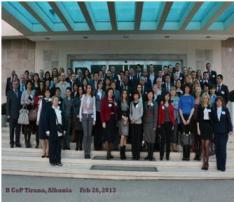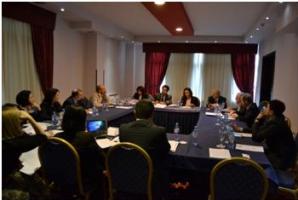Posted by Gelardina Prodani, Ministry of Finance, Albania andKonstantin Krityan, Ministry of Finance Armenia

As Chair and Deputy Chair of the Public Expenditure ManagementPeer Assisted Learning (PEMPAL)[1] Budget Community ofPractice (BCOP), we would like to inform you about an exciting meeting that washeld recently in Tirana, Albania on program budgeting.
From February 25th to 28th 2013, theMinistry of Finance of Albania hosted 81 participants from 21 PEMPAL membercountries from across Europe and Central Asia (ECA). As suggested by our BCOPmembers from last year’s plenary meeting,[2] the agenda focused ontechnical aspects of program budgeting and performance measurement. The threemain sessions of the meeting covered international approaches and country casesin (i) design of programs and performance measures, (ii) budget documentation,and (iii) performance monitoring and evaluation.
To setthe context in terms of PFM reform trends and priorities in ECA countries, theresults from recent cross-country studies were presented. This included resultsfrom two separate World Bank studies[3] and from OECD BudgetSurveys.[4] Global experiences indesigning budget programs and performance measures, presenting performanceinformation in budget documentation, and monitoring and evaluation of programresults were also examined. The agenda, presentations, and list of participantsare accessible at the PEMPAL web-site in the official languages of the network(English, Russian and Serbo-Croatian Bosnian) at http://www.pempal.org/event/read/78
Some of the key challenges being experienced in designing programsand selecting performance measures included lack of commitment and capacity ofline ministries and budget users to the reforms; the difficulty in choosingappropriate performance measures for some sectors; and how best to ensureprograms are linked to strategic priorities and national strategies.Strengthening the link between policy, planning and budgeting was seen as apriority by all countries with Albania sharing its strategic planning andevaluation reforms with other countries given its significant progress in thisarea over recent years. Budget users within the Albanian Government report quarterly notonly on budget execution but also on programs and performance measures. The Sectorfor Monitoring within the Ministry of Finance then evaluates those reports atthe level of outputs and sends their opinion back to the Budget Users as wellas to the Budget Planning Sector of the Ministry of Finance, which then usesthis information in the negotiations for the next year’s budget. The Council ofMinisters through its Strategic Planning Office (within the Prime Minister’sCabinet) performs the evaluation at the outcome and strategic goal level. Evaluations are then published for all the Budget Users. Transparencyis seen as an important part of line ministries taking theexercise seriously. Furthermore, the State Audit Institution undertakes annual performanceaudits as well as financial audits for each Budget User. Internal audit also hasa key role through monitoring whether the Budget Users implementrecommendations from the evaluations.
 All countries acknowledged that program evaluation is an essentialbut often weak link. It should be done both ex ante and ex post with a widerange of tools and stakeholders involved. It was noted that Supreme AuditInstitutions are well placed to contribute to program assessments withperformance audits now common in OECD countries. Such institutions are, however,still weak amongst some of the PEMPAL ECA countries and their performance auditcapacity is yet to be developed. Self-evaluation by program managers is alsoessential to ensure program corrections and more in-depth periodic reviewsshould also be undertaken. Oversight by central coordinating ministries such asMinistries of Finance was also seen as important to ensure focus on Governmentpolicy objectives as part of the annual budget process. Some Ministries ofFinance are struggling however, with the lack of good quality and consistentinformation on program performance being provided by the line ministries andbudget users and more broadly, with a lack of an overall agreed evaluationframework, methodologies and approach.
All countries acknowledged that program evaluation is an essentialbut often weak link. It should be done both ex ante and ex post with a widerange of tools and stakeholders involved. It was noted that Supreme AuditInstitutions are well placed to contribute to program assessments withperformance audits now common in OECD countries. Such institutions are, however,still weak amongst some of the PEMPAL ECA countries and their performance auditcapacity is yet to be developed. Self-evaluation by program managers is alsoessential to ensure program corrections and more in-depth periodic reviewsshould also be undertaken. Oversight by central coordinating ministries such asMinistries of Finance was also seen as important to ensure focus on Governmentpolicy objectives as part of the annual budget process. Some Ministries ofFinance are struggling however, with the lack of good quality and consistentinformation on program performance being provided by the line ministries andbudget users and more broadly, with a lack of an overall agreed evaluationframework, methodologies and approach.
Despite these challenges, our BCOP member countries areexperiencing significant progress as shown by recent surveys and are committedto improving program performance within their governments. Opportunities tomeet with peers from other Ministries of Finance in the region through PEMPALis proving invaluable as it enables common problems to be discussed and optionsand solutions to be developed and shared. Such meetings are also one of themain forums where key government actors can share information and draw lessonsfrom the latest analysis and research on PFM undertaken by internationalorganizations such as the World Bank, IMF and OECD. As leaders representing theBudget Community of Practice of PEMPAL[5], we will continue topursue such opportunities given our members’ commitment and passion toimproving public financial management across the region.
[1] Refer to www.pempal.org for moreinformation.
[2] Refer to an earlier IMF blog on this meeting at http://blog-pfm.imf.org/pfmblog/2012/05/program-budgeting-is-on-the-reform-agenda-across-europe-and-central-asia.html
[3]Refer topresentations by Ivor Beazley on PFM Performance and Reforms in ECA countriesand by Natalia Biletska on the MTEF study under 'Materials' at http://www.pempal.org/event/read/78. The full MTEF study ‘Beyond the Annual Budget: Global Experience with Medium TermExpenditure Frameworks' is available at https://openknowledge.worldbank.org/handle/10986/11971. This study empirically investigates the impact ofMTEFs on three key aspects of fiscal performance using a newly-collecteddataset for 181 countries over the period 1990-2008.
[4] Refer to presentations by Knut Klepsvik under 'Materials' at http://www.pempal.org/event/read/78 and alsorefer to http://www.oecd.org/governance/budgeting/internationalbudgetpracticesandproceduresdatabase.htm. There are currently plans in place for OECDto work with PEMPAL to extend the survey of budget practices and procedures tomore countries in the ECA region.
[5] These leaders form the BCOP Executive Committee which was newlyestablished in early 2012. They come from budget policy departments ofMinistries of Finance from the Albania, Armenia, Bosnia and HerzegovinaCroatia, Russian Federation and Turkey with new members appointed from Belarusand Russian Federation during the Tirana meeting. The Executive Committeeprovides strategic direction and leadership to the rest of the BCOP anddevelops and implements the activity plans (with the assistance of a donorfunded resource team).







